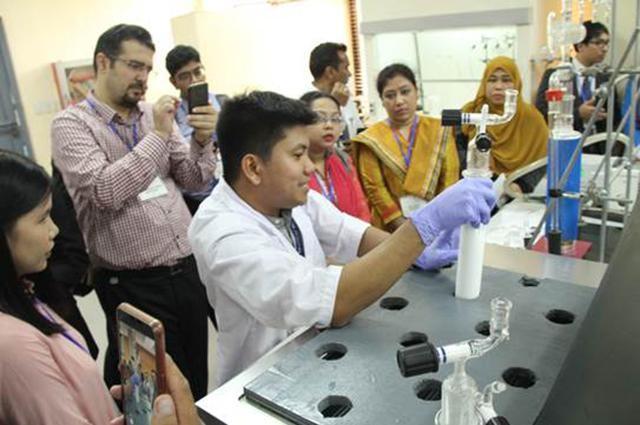Pinoy scientists invent abaca-based fabric that can filter out toxic pollutants in water
Chemists from the Department of Science and Technology – Philippine Nuclear Research Institute (DOST-PNRI) have recently developed an abaca-based fabric that can filter out toxic materials and other contaminants in wastewater.
According to a statement from DOST, this new type of non-woven fabric was developed from the natural fiber abaca and synthetic polymers which can filter heavy metals dissolved in liquid.
Some of these heavy metals are lead, cadmium, nickel, chromium, mercury and arsenic, which pose as health and environment hazards.

A researcher demonstrates radiation grafting procedures at the PNRI Chemistry Research Section during a training course. DOST
"The materials are grafted using radiation at PNRI’s Electron Beam Irradiation Facility, after which it is further processed into its final form as a synthesized filter for heavy metals," DOST said.
Radiation grafting changes the surface properties of polymers, without changing the composition of the bulk material.
DOST added that radiation grafting can be used to graft various polymers with advanced properties that filter various contaminants from water.
Compared to commercial resins regularly used to filter out waste, the abaca fabric was deemed as reusable, cheaper and on par, if not better, than its counterparts, according to the science agency.
According to Joan Tugo of DOST-PNRI, the abaca-based filter could be used in some industries as a treatment medium in the removal of chromium in tanning industry wastewaters, lead in lead acid battery recycling facilities, and other industrial wastewaters that contain heavy metals before releasing the effluents into the bodies of water."
This unique Pinoy invention was the Regional Winner for the Outstanding Utility Model Award during the 2019 DOST Regional Invention Contests and Exhibits (RICE) in the National Capital Region held in November.
—Angelica Y. Yang/JCB, GMA News

Need a wellness break? Sign up for The Boost!
Stay up-to-date with the latest health and wellness reads.
Please enter a valid email address
Your email is safe with us






